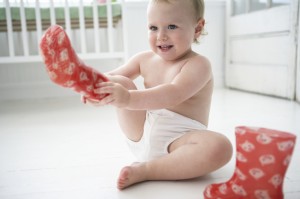“Toddlers really need time and patience in order to build independence and resilience”
When he’s young, it’s such a wonderful, heart-warming thing that your little one looks to you for everything. Rarely, if ever, have you felt more important. (Of course, he also often needs you in the middle of the night when you’re utterly exhausted, which can be less warm-and-fuzzy inspiring!) But while children are born highly dependent, looking to Mum and Dad support their every want and need as babies and young toddlers, there comes a time for you and your Au pair to ease off the reins. This can be a tricky period for you – you’ve just become confident and feel you’re finally mastering parenting, and now there’s the need for change. It’s an important shake-up, though, to help your toddler become independent and resilient.
Ready, set…
So how do you know if your tot is ready for independence? Look to his behavior and let this guide you. Mobile toddlers explore, touch, and get into everything in their world, but developmentally speaking this is more experiential learning that independence seeking. Soon after your tot will start to watch and mimic you, innocently figuring how to copy what you’re doing. He might try pouring the juice, for example, or stand with you while you’re doing chores. This is where independence begins: with your toddler going through the process of “observe, mimic and try”, even if it’s done clumsily.
Letting go
When signs of this independence begin to show, it’s only natural for those protective parental instincts to kick in, wanting to shield your child from danger or injury. The greatest challenge is to now begin allowing your toddler to have a go and to attempt independent actions. Reassure your Au pair, and tell her to behave in the same way. Before the alarms bells sound too loud, know there are plenty of import ant reasons why this sometimes-hard step is so necessary for your littlie. We know that independent kids are more successful, more social and more secure, and generally have better self-esteem. Children who are encouraged to be independent and to “have a go” also tend to be more confident and have fewer anxiety problems. They also bounce back better after setbacks. And despite your most well-meaning intentions, overprotecting your child can actually increase the likelihood of him becoming nervous, insecure and less resilient.
ant reasons why this sometimes-hard step is so necessary for your littlie. We know that independent kids are more successful, more social and more secure, and generally have better self-esteem. Children who are encouraged to be independent and to “have a go” also tend to be more confident and have fewer anxiety problems. They also bounce back better after setbacks. And despite your most well-meaning intentions, overprotecting your child can actually increase the likelihood of him becoming nervous, insecure and less resilient.
Where to begin
While still allowing for safety concerns, the first positive step in supporting independence is to encourage your toddler to attempt challengers, rather than fearing mistakes or errors. This will result in some spills and falls, but toddlers learn to be confident from such bold attempts. Language is very important at this stage, with positive encouragement, regard and confidence-boosting from you helping to build your little one’s independence. For example, in letting your toddler try to pour a drink, you might say, “I’m sure you can try, let’s have a go, we’ll be careful, but a little spill won’t matter.” It’s important you stay true to your word, too, keeping calm and supportive in the face of little spills and messes. Similarly, as your toddler tries to dress himself, be positive and encouraging, even if he doesn’t get everything even and straight the first time around. W ell-meaning but overly protective language and actions can inadvertently undermine independence and resilience, so avoid taking over (“Let Mummy do it, you’re making a mess”, or “Oops, be careful, I’ll do it so you don’t get hurt”). Continuing with this can lead to your tot always looking to you for help, which can leave him more vulnerable to being overtaken by assertive peers. The key thing to remember is to remain encouraging, no matter the outcome. The speedy, hectic pace of life can also work to undermine independence – does, ‘Quick, Mummy doesn’t have time, you’ll get it wrong, let me do it“, sound familiar? Try to be conscious of this and avoid overtaking your child as you rush to get ready for work and daycare. Toddlers really need time and patience, and to have a few goes at something in order to build independence and resilience.
ell-meaning but overly protective language and actions can inadvertently undermine independence and resilience, so avoid taking over (“Let Mummy do it, you’re making a mess”, or “Oops, be careful, I’ll do it so you don’t get hurt”). Continuing with this can lead to your tot always looking to you for help, which can leave him more vulnerable to being overtaken by assertive peers. The key thing to remember is to remain encouraging, no matter the outcome. The speedy, hectic pace of life can also work to undermine independence – does, ‘Quick, Mummy doesn’t have time, you’ll get it wrong, let me do it“, sound familiar? Try to be conscious of this and avoid overtaking your child as you rush to get ready for work and daycare. Toddlers really need time and patience, and to have a few goes at something in order to build independence and resilience.
Can-do attitude
Instilling independence also relies on teaching good mood regulation. This means helping your child to avoid throwing tantrums or becoming distressed when attempts go wrong, but rather to accept the failures and errors that occur. Finally, building independence relies on unconditional love and genuine regard. Toddlers who sense that they’re loved by Mum and Dad and their Au pair regardless of whether or not they mess up, and who are regarded for trying to be “big kids”, are generally more independent and confident. In the simplest terms, it’s all about encouraging your littlie to adopt a true-blue “have a go” attitude.